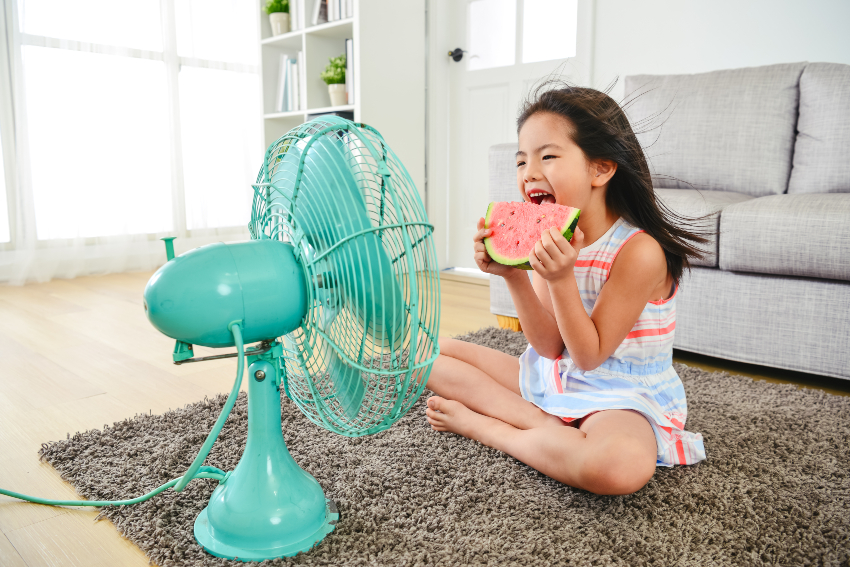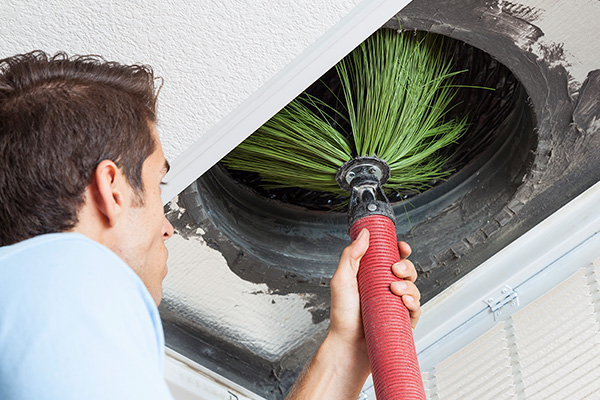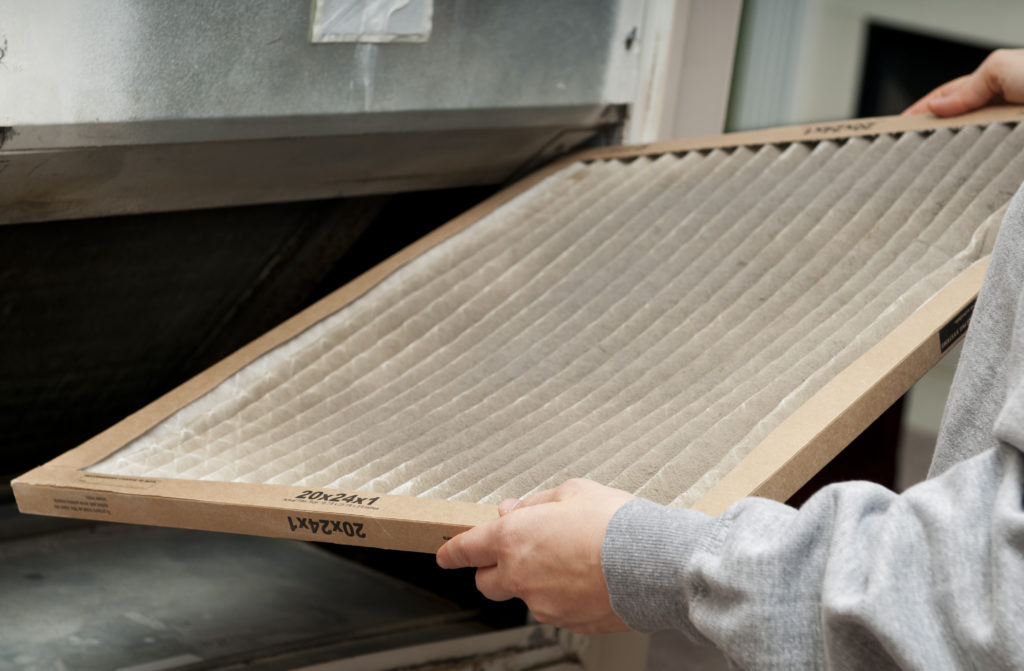Get a Handle on Home Humidity
Posted on by WestAIR Heating & Cooling

Around this time last year, we wrote about surprising ways to reduce humidity in your home. We hope some of those tips proved helpful. With the recent summer rain, heat, and excess moisture, we thought now would be an ideal time to revisit the issue to help you get a handle on home humidity.
Humidity levels
Humidity is the amount of moisture in the air around you. During the summer, humidity levels in your home should measure between 30-50 percent. Humidity levels that are too high or too low can lead to issues with your comfort, health, and home.
Too much humidity prevents the body from regulating its internal temperature, making you and your family feel sticky and uncomfortable. Excess moisture also promotes mold, fungus, and dust mites, which can wreak havoc on allergies and make you sick. Over time, dampness within the home can warp floorboards or furniture and cause wood to rot, resulting in costly repairs.
Conversely, too little humidity causes skin to feel itchy and can dry out the body’s mucous membranes, leading to sore throats, coughing, and nosebleeds. Dryness affects your home, too, when door frames or other features or furnishings made from wood begin to crack, shrink, or bend.
Poor humidity? Here’s how to tell
Establishing a comfortable home environment relies on finding an appropriate balance of air moisture. How do you know if your home humidity levels are out of whack? Look for indicators such as:
- Condensation. Water beads are visible on the inside of the windows.
- Constant sweating. You experience persistent perspiration, even after taking a cool shower.
- Musty smells. You may not be able to see mold and mildew, but you can smell it.
- Difficulty sleeping. Excess moisture makes the body work harder to cool itself, which can be a challenge when you’re trying to fall or stay asleep.
- Water spots. Watch for stains on the walls, ceilings, or basement floor, especially after or during a rain shower.
- Trouble breathing. High humidity can trigger allergies and asthma symptoms.
Regulating home humidity
Summer is sticking around for a bit longer, so make sure you’re enjoying the tail end of the season by staying cool and dry at home. Here are some reminders for keeping home humidity levels low.
- Use exhaust and ventilation fans in the kitchen and bathroom. Leave those fans on for a short while after you’ve finished cooking or showering to ventilate humid air.
- Take advantage of your air conditioner. Your A/C unit brings in cooler air while expelling warmer, humid air.
- Take shorter, cooler showers. The less hot water you use, the less steam and humidity build up in the air.
- Check your gutters. Keep them free from debris to avoid water buildup and indoor leaks. Also, be sure the downspout is positioned away from your home.
- Consider investing in a dehumidifier. These portable appliances or whole home systems can help remove moisture from the air.
The experts at WestAIR Heating & Cooling are here to discuss your home humidity concerns and needs. Our technicians can explain how our high-efficiency air conditioners or air quality accessories can help you stay cool and achieve optimum indoor air quality throughout the summer. Contact us today to schedule service.
This entry was posted in Cooling,Humidity,Indoor Air Quality and tagged Air conditioner, Air quality, Air quality accessories, Humidity, humidity levels, Indoor humidity, regulating humidity
Air Duct Cleaning & Maintenance
Posted on by WestAIR Heating & Cooling
Clean air ducts help keep dirt, dust mites, and mold out of the air of your home. Turning on a contaminated or clogged heating and cooling system can cycle these potentially harmful particles into the air you breathe and decrease indoor air quality. How do you know if you need an air duct cleaning service?
Check with your local HVAC technician to find any visible mold or excessive dust and debris inside your ducts, or if there has been a recent infestation of rodents or insects.
Keep your ducts clean by practicing proper home habits.
• Change your furnace and air conditioner filters regularly.
• Check to make sure you use the right air filters that fit your equipment.
• Make sure your HVAC equipment is efficient and regularly maintained.
• Dust and vacuum your home regularly. Vacuuming can increase the amount of dust in the air, so it’s worth upgrading to a high efficiency (HEPA) vacuum cleaner.
• Seal off supply and return registers during home renovation or construction.
• Maintain your humidifier to prevent mold inside the home.
• Repair leaks and water damage promptly.
• Make sure ducts are sealed properly and insulated in attics and crawl spaces.
• Invest in an Aprilaire Air Cleaner to reduce the amount of dust circulating around your home. Air cleaners trap 98 percent of visible dust and irritating particles, and 97 percent of airborne pollen. Attached to your furnace, the filters remove matter through the blower fan and return clean air back into the rooms of your home.
Air duct cleaning is not an annual service, but might be needed after some time, especially if you have pets, smoke, sensitive allergies, respiratory needs, or live in a humid environment.
At WestAir Heating & Cooling, we use a specialized Rotobrush cleaning system to clean air duct systems. This “source removal” cleaning method utilizes powerful vacuums and brushes to dislodge any debris that stick to the surface.
If you think you might need your ducts cleaned or worry about your indoor air quality, contact us for more information.
This entry was posted in Duct Cleaning,Health Tips,Indoor Air Quality and tagged Air cleaner, Air cleaning, Air ducts, Air filter, Air filtration, Air quality, Allergies, Aprilaire, Clogged ducts, Cooling, Dander, Debris, Dehumidifier, Dirt, Dirty ducts, Duct cleaning, Duct maintenance, Ducts, Dust, Heating, Humidifier, HVAC, Mold, Moldy ducts, Particles, Pets, Pollen, Rotobrush, Vacuum
Extend the Life of your HVAC Equipment
Posted on by WestAIR Heating & Cooling
Having a working furnace and air conditioner is crucial during the winter and steamy summer days. Don’t run it and forget about it, as wear and tear is inevitable. You can save on costly replacements or repairs through proper maintenance. Extend the life of your HVAC equipment by following these steps.
Heating & Cooling Tips
1. Follow manufacturer instructions.
2. Have your systems checked every year by a qualified service technician. It’s best to schedule maintenance in the spring and fall. Technicians are busy in the hot and cold months, and you don’t want to wait until there’s something wrong.
3. Check your filters. Replace your filters every 30 to 60 days. If you have a permanent filter, clean it with mild detergent every 30 to 60 days. This is the most important step to increase the life of your equipment. Dirty filters make heating and cooling units work harder, which will shorten the life with use.
4. Keep your doors and windows closed. Your air conditioner and heater will work harder when there is more air to circulate. Make each space with ventilation smaller by closing your doors. This is the also the case for houses with boilers or window air conditioners. Rather than labor to regulate air temperature in the whole house, your a/c only needs to cool the individual room. With a boiler system, it’s efficient to close off rooms without a radiator.
5. Caulk and weather-strip air gaps on windows. This step is good for your wallet and your HVAC equipment. Old houses are especially drafty, so locate the air leaks by finding damaged glazing or old caulking. Another trick is to turn off all appliances and light an incense stick in each room. Turn on your exhaust vent if you have one. Then hold your incense stick close to windows, doors, and walls for a noticeable change in the smoke. If you have drafty doors, invest in some door draft blockers.
6. Use your thermostat. It’s a myth that you should keep your thermostat at a steady temperature. Most of the time, your furnace will be working harder to maintain the heat at a steady rate. Instead, program your thermostat for a comfortable temperature while you are home and ten degrees less while you are away. However, fidgeting with the thermostat will be less efficient, even if it seems harmless to put it up or down a degree or two. Keep it on a consistent schedule.
Energy Efficiency
Winter
1. Open window shades when windows are facing the sun. Let the sun warm your house naturally, putting less work on your furnace. The vitamin D is good for you this time of year!
2. Take advantage of using your oven. Slow cook your chicken and oven roast your veggies. The extra warmth will give your furnace a break. Your oven will be working two jobs at once without the added cost.
Summer
1. Close window shades facing the sun. Opposite of wintertime, you want to block the sun from adding extra heat to your house. Make sure to put your plants outside so they don’t suffer from the lack of sun!
2. Be smart with your other appliances. When you are doing laundry, hang up your clothes on a line to save energy or strain on your a/c. Why work an appliance that uses heat when it’s already hot outdoors? Washing clothing shouldn’t be an issue, though, if you stick to cold water. If it’s humid out, dry your clothes during the coolest part of the day: around dawn. Same goes for dishwashers.
3. Use your exhaust fans when cooking. Whether you plan on using the oven or stovetop for dinner, turn on the exhaust fan to let out the excess moisture and heat. Or maybe fix a cold sandwich or salad. In return, your air conditioner won’t have to work as hard! Same goes for your bathroom, but not everyone likes cold showers!
Annual Service Maintenance
Spring is around the corner, so it’s time to schedule your maintenance visit with WestAir Heating & Cooling.
Our technician’s maintenance list will take care of most things you cannot do yourself to ensure your equipment is running smoothly for summer and winter:
Annual Service Maintenance list:
• Clean furnace and check operation/filter
• Clean air conditioner and check operation
• Clean outdoor condenser and check refrigerant level
• Clean air exchanger filters and core
• Check radiant in-floor pressures and go over system
• Check humidifier filter and drain line
• Check unit heater operation
• Clean fireplace and check operation
Contact us for more information on heating, cooling, or our service maintenance!
This entry was posted in AC,Air Conditioning,Cooling,Furnace,Heating,Winter and tagged A/C, A/C, Air conditioner, Air filters, Air quality, Annual check-up, Caulk, Clogged filter, Cold air, Cooking, Cooling, Cost, Dirty, Dishwasher, Door draft stopper, Doors, Drafty windows, Dryer, Efficiency, Energy efficient, Exhaust fan, Fall, Filter, Filters, Furnace, Furnace filter, Heater, Heating, HVAC, Laundry, Maintenance, Quality, Save money, Shower, Spring, Summer, Sunshine, Sustainability, Thermostat, Windows, Winter
Why You Should Change Your Furnace Filter Often
Posted on by WestAIR Heating & Cooling
Changing your furnace filter seems to be an easily forgotten task. HVAC companies try their hardest to remind you to do these things, but do you know why you should change it more often than you think?
Maintenance
Getting an oil change for your car is as important as changing the furnace filter for your house. It simply extends the life of your equipment. A dirty filter means that less air is circulating, which then means that your furnace is working harder to keep your house warm. Over time, having a furnace go into overdrive for too long can overheat the system or break down the entire unit. This is not something you do want to deal with in subzero temperatures.
A little dirt can do a lot of damage. If your furnace filter is dirty, not only will it make your HVAC unit work harder, but it will also make your heating bills go up over time. All the extra effort that this heater is putting out digs a deeper hole into your wallet. While a new furnace filter might cost money, ignoring it will cost more in your gas bill, except you’re doing more damage than good by trying to be frugal.
Air Filter Quality
Skip the fancy furnace filters. A furnace filter is designed to protect your furnace, not improve indoor air quality. Some people swear by these special filters, but you’ll most likely have to run your furnace fan year-round to get the benefit of a high-efficiency filter. Extra work and extra care (replacing them often) will cost you more in the end.
There is a happy balance that you could achieve between cost and efficiency. For homeowners, we recommend purchasing a MERV 7 or 8 pleated filter, which traps 80 to 95 percent of air particles. If you are looking to get rid of pollutants and breathe cleaner air, consider getting an air cleaner instead.
When to call your HVAC technician
– Unit fails to turn back on
– Noisy or slow fan
– Bent fins
– Coils are extra dusty
Remember to change your furnace filter every month when fan is in use for heating and cooling seasons.
Got more furnace questions? Call us at (763) 498-8071.
This entry was posted in AC,Air Conditioning,Cooling,Energy Savings,Furnace,Heating,Indoor Air Quality,Tips and tagged Air filters, Air quality, Clogged filter, Cold air, Cost, Dirty, Efficiency, Filter, Filters, Furnace, Furnace filter, Heater, Heating, HVAC, Maintenance, Quality, Save money, Winter
Subscribe to Our Blog
With RSS feeds, you don't have to visit our site everyday to keep up to date. Simply subscribe to our blog via RSS or Email and our posts will come to you!
Search Blog Posts
Categories
Archives
- April 2024 (1)
- February 2024 (1)
- January 2024 (1)
- February 2023 (1)
- January 2023 (1)
- December 2022 (1)
- November 2022 (1)
- October 2022 (1)
- September 2022 (1)
- August 2022 (1)
- July 2022 (1)
- June 2022 (1)
- May 2022 (1)
- April 2022 (1)
- March 2022 (1)
- February 2022 (2)
- December 2021 (1)
- November 2021 (1)
- October 2021 (1)
- September 2021 (1)
- August 2021 (1)
- July 2021 (1)
- June 2021 (1)
- May 2021 (1)
- April 2021 (1)
- March 2021 (2)
- January 2021 (1)
- December 2020 (1)
- November 2020 (1)
- October 2020 (1)
- September 2020 (1)
- August 2020 (1)
- July 2020 (1)
- June 2020 (1)
- May 2020 (1)
- April 2020 (1)
- March 2020 (1)
- February 2020 (2)
- November 2019 (1)
- August 2019 (2)
- June 2019 (1)
- May 2019 (1)
- April 2019 (1)
- March 2019 (1)
- February 2019 (1)
- January 2019 (1)
- December 2018 (1)
- November 2018 (1)
- October 2018 (1)
- September 2018 (1)
- August 2018 (2)
- July 2018 (1)
- May 2018 (1)
- April 2018 (1)
- March 2018 (1)
- February 2018 (1)
- January 2018 (1)
- December 2017 (3)
- November 2017 (2)
- October 2017 (2)
- September 2017 (2)
- August 2017 (1)
- July 2017 (2)
- June 2017 (3)
- May 2017 (2)
- January 2017 (4)
- November 2016 (1)
- September 2016 (3)
- July 2016 (2)
- June 2016 (2)
- May 2016 (4)
- April 2016 (1)
- March 2016 (2)
- February 2016 (2)
- January 2016 (1)
- August 2015 (1)
- July 2015 (1)
- June 2015 (3)
- May 2015 (1)
- July 2014 (2)
- June 2014 (1)
- April 2014 (1)
- March 2014 (1)
- February 2014 (2)
- October 2013 (1)
- May 2013 (1)
- March 2013 (1)
- February 2013 (1)
- August 2012 (1)
- July 2012 (2)
- June 2012 (2)
- May 2012 (2)
- March 2012 (1)
- February 2012 (1)
- December 2011 (1)
- November 2011 (1)
- October 2011 (1)
- September 2011 (1)
- August 2011 (1)
- June 2011 (1)
- May 2011 (1)



 Subscribe
Subscribe Subscribe
Subscribe